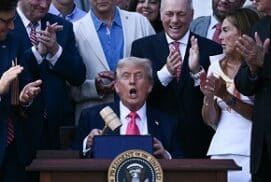Analyses
United States
- Andre Diniz Pagliarini 17 December 2025For months, U.S. naval forces have been gathering off Venezuela’s coast. The warships, the bomber flyovers, and the rising volume from Washington are not incidental. The likelihood of an actual intervention is not incidental. It is in line with the administration’s recently presented geopolitical priorities. The new National Security Strategy, released earlier this month, explicitly elevates the Western Hemisphere as a central arena of U.S. national security, linking migration, narcotics trafficking, and regional instability to the defense of the homeland.
- Hussein Ibish 6 November 2025As the Democratic Party struggles in the political wilderness following last year’s national Republican sweep, the American left is being electrified by the improbable and inspiring election on Tuesday night of Zohran Mamdani as the mayor of New York City.
- Andre Diniz Pagliarini 16 October 2025Donald Trump insists he wants no “new wars.” In Latin America, however, that line is wearing thin. His administration has revived the language and logic of forceful intervention even as he maintains that the era of U.S. adventurism abroad is over. The result is a foreign policy that races to prop up allies like Argentina’s Javier Milei and Brazil’s Jair Bolsonaro while threatening adversaries like Venezuela’s Nicolás Maduro and Colombia’s Gustavo Petro.
- Jim Sleeper 3 October 2025
- Hussein Ibish 7 July 2025The U.S. has never been short of hideous or harebrained legislation from both liberals and conservatives. But President Donald Trump’s “Big Beautiful Budget Bill,” passed on Thursday by Congress, outdoes anything in living memory. In one gigantic sweep, it enacts at least four major national initiatives, each of which would alone qualify as among the most appalling legislative acts in modern American history.
- Hussein Ibish 16 June 2025It’s a real-life film noir in the City of Angels. U.S. President Donald Trump is once again hurling Americans through the looking glass, this time – fittingly – in Los Angeles. It feels lifted from 1930s hard-boiled pulp fiction in which nothing is as it appears and everything is the inverse of what powerful men assert. It’s genuinely shocking, while also seemingly inevitable, that U.S. military forces are being deployed to major cities with the express purpose of trying to intimidate, quash, and, ultimately, violently confront Americans who dare raise their voices against Mr. Trump’s policies and practices. It is one of the most significant inflection points since the last election took America on the road away from constitutional democracy and towards the kind of repressive lawlessness this President admires in other leaders and is seeking to emulate in the U.S.
- Hussein Ibish 12 May 2025From May 13-16, President Donald J. Trump will repeat the opening gesture of his first administration by making the initial major diplomatic travel of his second term to Saudi Arabia (excluding his unanticipated visit to Rome for the funeral of the late Pope Francis) but this time also including the United Arab Emirates and Qatar. This trip comes at a highly significant moment in U.S.-Gulf Arab relations, and all parties will have specific agendas and deliverables at stake. Overall, Trump’s trip reinforces the centrality of these partnerships for all sides and signals that he continues to view Gulf Arab countries as important partners, not just for the United States but for his personal and political goals.
- Massimo Faggioli 7 May 2025In the history of the United States, this is the era of Donald Trump. The transition from Joe Biden to Trump does not represent a normal transition of power, but rather a regime change. It marks the rise of charismatic leadership and, in the eyes of many, even a form of political messianism, often at odds with the constitutional rule of law. Trump’s second presidency steers America onto a path few – especially in Europe – had anticipated or even imagined, opening up unpredictable scenarios both domestically and internationally.
- Hussein Ibish 18 April 2025In the increasingly surreal second Donald Trump administration, a 29-year-old Salvadoran named Kilmar Abrego Garcia now embodies the most fundamental restructuring of the US constitutional order, arguably in its history. Mr Garcia is being used as a test case for the Trump administration to decouple Americans from the rule of law and protection of courts. His case may be operating at the margins of American society, but its implications potentially represent a redefinition of the relationship between the individual and the US government.











